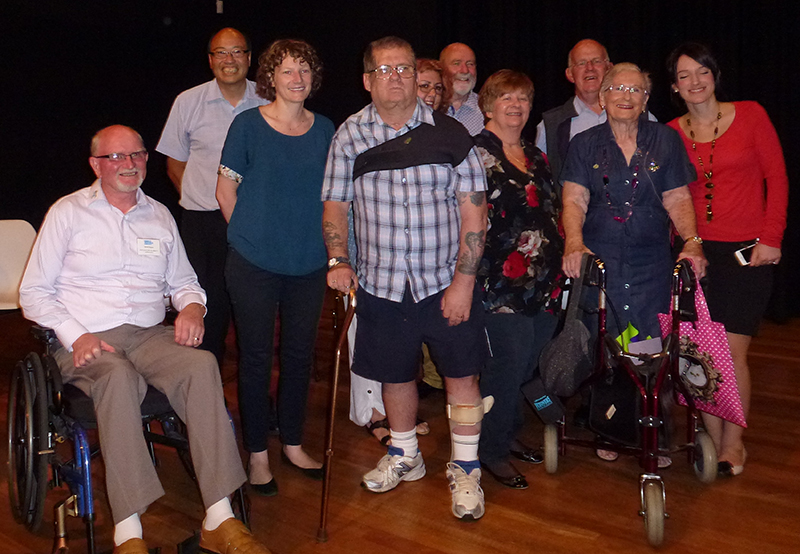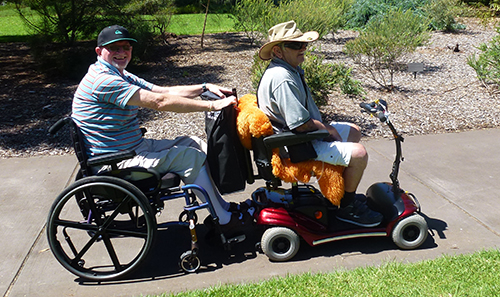Camden Stroke Support Group
Stroke support groups can challenge people to get beyond their limitations. Social interaction and simply feeling connected to others who understand may help to ease the depression and isolation so common after stroke.
A positive attitude is such a big part of emotional and physical healing, and one of the greatest benefits of a stroke support group is the opportunity to be around people with great attitudes. Survivors often find that the 'I can do this' attitude of an effective stroke group is infectious and changes their experiences.
The wonderful David Napier shares his experience with starting the Camden Stroke Support Group, and what the stroke group has meant to him.
Over to you David.......

I feel blessed to have started the Camden Stroke Recovery Club with a colleague Malcolm - that was eleven years ago.
Our first meetings were held at the local RSL, unfortunately this proved a challenge for some of our members so we reached out to the Camden Council and they came through with a room.
Our bi-monthly meetings over the eleven years have proved bitter-sweet, and also incredibly fulfilling and rewarding.
Malcolm was elected as our first Chair and I treasurer - a position that still hold today. The meetings have evolved over time, but the vital support that we give each other has remained the same.
Our group meets to play games or just sit and talk, we then have lunch as a group in the local hotel or a picnic. As a group we like to keep our activities dynamic - we’ve done photographic exhibitions and art exhibitions for National Stroke Week. We’ve supported local hospitals where we raised thousands of dollars to fund equipment and other support programs. We’ve held morning teas with stroke hospital patients to make them feel less isolated. We are constantly looking for ways to support the local community and local stroke survivors, and it keeps us on our toes.
After a time Malcolm left to do something else, but David and Chris Crooks stepped up to the plate as I could not. Unfortunately I am profoundly disabled from a Neurological condition and always need a carer - my wonderful wife.
We’re not a big group, but we’re good friends and these friendships continue to flourish. The bitter-sweet part that I’ve talk about is saying Goodbye to our friends, we’ve lost some members along the way and their passing has affected each and every one of us greatly. But we cherish their memory and continue to make the lives of those we still have the best that they can be.
As a group we support the carers and family, a stroke affects everyone and carers are the ones who make things happen.
I have not had a stroke, my challenges are caused by another disease, but my commitment to the stroke community and to start a stroke support group was because I lost my father and brother to stroke. It was devastating, both were thousands of miles away, so the help that I could offer was limited by the distance.
For me it has been a time to make new friends and to become part of their lives. The members of our group are all remarkable people and have left an indelible mark on my life.
This quote by John Wesley this is my mantra.
'Do all you can, by all the means you can, in all the ways you can, in all the places you can, at all the times you can, to all the people you can as long as you ever can.'
More from David.....
1. What is are some tips for people wanting to start their own stroke group?
Commitment, organisational skills, local hospital involvement, procuring the right safe places for meetings etc. To be inclusive in all that you do, have a group of people who can lead and I mean lead no individual is treated with anything but respect, and vary your programme.
2. What are some tips for people thinking about joining a local stroke support group?
Can you move on with your condition and start the beginning of your recovery, are you a people person, do you like to share your experiences have you got passed the grieving process, remember the people who are leading the group are all volunteers they are not medical professionals they may know some of the answers but ultimately in medical matters your GP or Neurologist are the go to people on medical matters
3. Do carers/partners/family also attend your stroke support group?
Yes and that is important, but they can also leave the person they care for with us knowing they will be safe - carers and family can use that for some ‘ME’ time
4. What is one of your favourite memories from your Camden stroke support group?
It would have to be ‘mate to mate’ the time my late mate Steve. He pulled my manual wheelchair up the hill when he saw I was in trouble - the faces of the group was priceless, as was my wife, my full time carer. I still don’t know how he did it!
When I was a ‘Don't Dis My Ability’ Ambassador for NSW. I had to give a speech, I was able acknowledge by name the whole group and what they meant to me.

